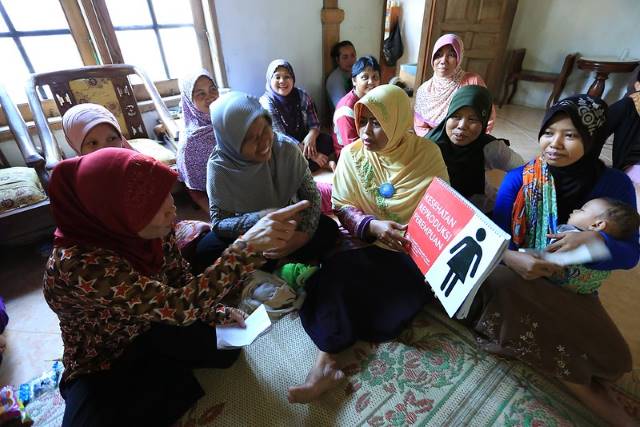The Aisyiyah Women’s Movement in Indonesia
 In Central Java province, Indonesia, a group of Aisyiyah volunteers planted mahogany, sengon and teak trees. Aisyiyah is the oldest Islamic women’s movement in Indonesia, founded in 1917. Aisyiyah has four million members dispersed throughout the country. In March 2021, Aisyiyah pledged to plant five million fruit trees in Indonesian homes and gardens, which will contribute to fighting food insecurity during COVID-19.
In Central Java province, Indonesia, a group of Aisyiyah volunteers planted mahogany, sengon and teak trees. Aisyiyah is the oldest Islamic women’s movement in Indonesia, founded in 1917. Aisyiyah has four million members dispersed throughout the country. In March 2021, Aisyiyah pledged to plant five million fruit trees in Indonesian homes and gardens, which will contribute to fighting food insecurity during COVID-19.
The Impact of COVID-19
In the last few decades, Indonesia has reduced poverty significantly. The poverty rate has been reduced by more than 50% since 1999, with a poverty rate of 9.78% in 2020. Unfortunately, the pandemic has disrupted the country’s poverty progress. Between March and September 2020, the national poverty rate increased from 9.78% to 10.19%. Approximately one million more people fell below the poverty line due to the pandemic, reversing three years of progress. The Indonesian Government has taken swift action by implementing emergency monetary aid to support households and companies, ensuring a sufficient vaccine supply and improving social benefits and healthcare systems. In addition, the government promised to reduce emissions by 29% in nine years. Most of Indonesia’s emissions come from land conversion so the government intends on implementing reform to protect land and forests.
Aisyiyah has a quest to plant millions of fruit trees, which will help reduce the pressure on forests and feed families. The group cooperates with the national government and other organizations, enabling Aisyiyah to extend its outreach. The women’s movement in Indonesia has strategically multiplied its impact, becoming a powerful force for change.
Aisyiyah’s Environmental Wing
In 2015, the organization created its environmental wing known as the LLHPB to help women respond to natural disasters and climate-related issues. The sector has since expanded its horizons, helping the country reach its emission goals and fight against natural disasters. In the Kalimantan area of Indonesia, volunteers help prevent wildfires. In rural areas of Indonesia, reforestation efforts have faced numerous roadblocks, including weak seedlings and failure to maintain trees after the seeds were planted. Since the close of 2020, Aisyiyah volunteers have planted 4,700 tree seedlings.
Addressing the drought in the Sukoharjo area of Indonesia, members of Aisyiyah purchased gallons of water for affected families. The LLHPB plans to collaborate with the Peatland and Mangrove Restoration Agency to rehabilitate destroyed forests and land in the province of Riau. Together, the organizations and others will replant 600,000 hectares of mangrove forests by 2024.
Aisyiyah’s Connection to the Muslim Faith
Indonesia’s population is predominantly Muslim so Aisyiyah caters its environmental activism to the Muslim audience. The organization uses teachings of the Muslim faith to explain to people why environmentalism is important. According to the Muslim faith, humans are guardians of nature. Aisyiyah promotes this teaching through “Green Ramadan,” a nightly informational session about plastic waste reduction that lasts through the month of Ramadan. Muslims do good deeds during this month so Aisyiyah promotes environmental consciousness as an easy good deed. LLHPB members consider environmental work as elemental to their faith, which corresponds to a message that spreads to the “Green Ramadan” audience.
History of Aisyiyah
Aisyiyah was founded in 1917 as a female education movement in response to the lack of formal schooling for girls. Today, it operates thousands of schools, supports healthcare centers and runs social programs to promote breastfeeding and improve child and maternal health. The organization encourages its international members to advocate for reproductive rights and discourage child marriage. As a non-governmental organization, donations and fundraising activities fund Aisyiyah’s work.
The Aisyiyah women’s movement in Indonesia now works in 33 provinces and more than 7,500 rural Indonesian villages. As of 2016, it has supported more than 1,000 family business ventures to improve household poverty. Through its Empowering Indonesian Women for Poverty Reduction Program (MAMPU), Aisyiyah reached almost 9,000 women and provided training to more than 1,000 local leaders.
Aisyiyah is addressing issues of poverty and the environment in Indonesia by planting trees and dedicating efforts to education, women’s empowerment and child and maternal health, among other issues. Aisyiyah is an inspiring example of a local organization making a significant impact.
– Rebecca Pomerantz
Photo: Flickr
